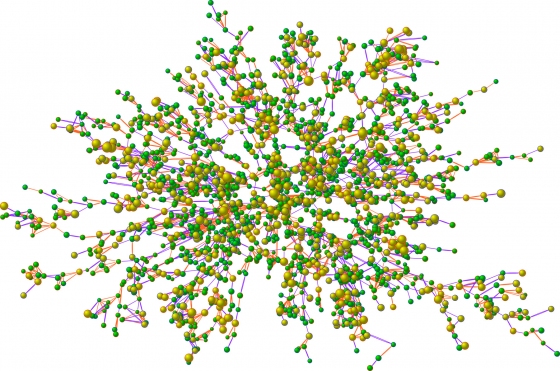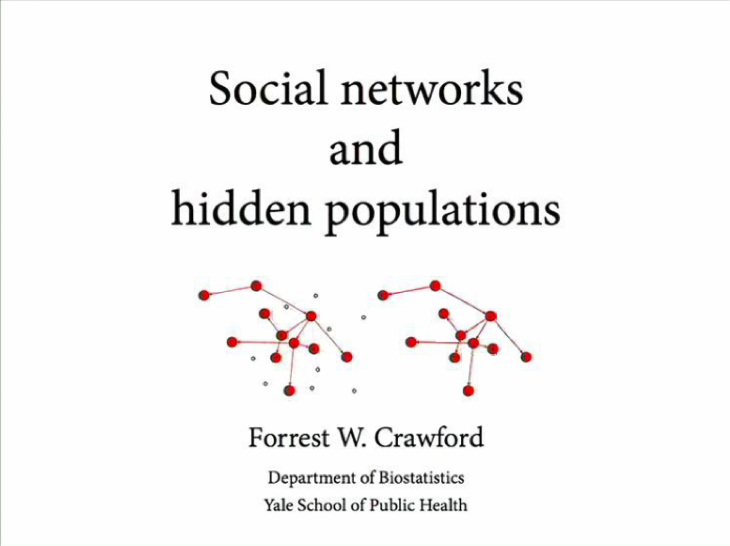This year we are excited to announce the following course offerings in network science. Some have been offered in the past and some are new this semester. More information regarding all courses can be found on OCS.
AMTH 561/CPSC 662: Spectral Graph Theory
Spielman, Daniel
AMTH 561/CPSC 662, is a graduate course on Spectral Graph Theory and related topics. It will be taught in the style of a math class. I will present a bunch of theorems, a few algorithms, and many open problems. I have chosen to only present material that I consider beautiful. My other goals are to present material that is useful and to introduce fundamental concepts. The obvious prerequisites for this course are knowledge of linear algebra and exposure to graph theory. The less obvious requirement are “mathematical maturity” and “mathematical literacy”. I will sometimes make use of concepts that every graduate student in Mathematics should know. I assume that students who are not familiar with these can look them up.
CB&B 752/MCDB452/MB&B752/MCDB752/CPSC752/MB&B452: Bioinformatics: Practical Application of Data Mining & Simulation
Gerstein, Mark
Bioinformatics encompasses the analysis of gene sequences, macromolecular structures, and functional genomics data on a large scale. It represents a major practical application for modern techniques in data mining and simulation. Specific topics to be covered include sequence alignment, large-scale processing, next-generation sequencing data, comparative genomics, phylogenetics, biological database design, geometric analysis of protein structure, molecular-dynamics simulation, biological networks, normalization of microarray data, mining of functional genomics data sets, and machine-learning approaches to data integration.
EENG 442/E&AS 902/AMTH 342: Linear Systems
Morse, A.Stephen
This is an introductory course about finite-dimensional, continuous and discrete-time linear dynamical systems. The course is intended for undergraduate and graduate students interested in the systems, information, and computer sciences including robotics, control, signal and image processing, computer vision, communications and computer networks, economic and financial modeling. Some knowledge of matrix algebra is recommended.
EENG 452/ENAS 952: Internet Engineering
Tassiulas, Leandros
The aim of the course is to introduce the basic Internet protocols and architectures. The topics to be covered include packet-switch and multi-access networks, routing, flow control, congestion control, Internet protocols (IP, TCP, BGP), the client-server model, naming and DNS, wireless access networks (WIFI), mobile communications. The basic architectural concepts of packet switching networks will be studied extensively, including important operating algorithms. Extensive experimentation in networking testbeds will be used as a vehicle to illustrate the concepts.
EENG 444/ENAS 944: Digital Communication Systems
Hu, Wenjun
The course gives an overview of the designs of digital communication systems. We will start with example coding and modulation techniques in the context of image/video coding and 2D barcodes, before proceeding to the theoretical background underlying these techniques. We explain the mathematical foundation of decomposing the systems into separately designed source codes and channel codes. This is followed by an introduction to the principles and some commonly used algorithms in each component to convert continuous time waveforms into bits, and vice versa.
Using communication system design as a case study, this course also serves as a sampler of related topics, such as information theory, signal processing, linear systems, stochastic processes, and detection and estimation, each with applications in a wide range of areas. There is a comprehensive introduction to the basics of information theory, a rather detailed treatment of Fourier transforms and the sampling theorem, and an overview of the use of vector spaces in signal processing.
EENG 202: Communication, Computation, and Control
Tatikonda, Sekhar
This course is an introduction to systems that sense, process, control, and communicate. Topics include communication systems (compression, channel coding); network systems (network architecture and routing, wireless networks, network security); estimation and learning (classification, regression); and signals and systems (linear systems, Fourier techniques, bandlimited sampling, modulation). MATLAB programming and laboratory experiments illustrate concepts.
EENG 437: Optimization Techniques
Tatikonda, Sekhar
This course will examine fundamental theory and algorithms of optimization, emphasizing convex optimization. Topics include the geometry of convex sets, basic convex analysis, the principle of optimality, and duality. Students will also learn about numerical algorithms: steepest descent, Newton’s method, interior point methods, dynamic programming, and unimodal search. Course material has applications from engineering and the sciences.
ENAS 900b: Distributed Computation and Decision Making
Morse, A. Stephen
Within the field of network science there has long been interest in distributed modeling, distributed computation and distributed decision making problems of many types. Among these are flocking problems, consensus problems with and without antagonistic interactions, the multi-robot rendezvous problem, distributed averaging, localization of sensors in a multi-sensor network, opinion dynamics, and the distributed management of robotic formations. The aim of this course is to explain what these problems are and to discuss their solutions. Related concepts from spectral graph theory, rigid graph theory, nonhomogeneous Markov chain theory, stability theory, and linear system theory will be covered. Although most of the mathematics need will be covered in the lectures, students taking this course should have a working understanding of basic linear algebra.
ENAS 962: Theoretical Challenges in Network Science
Karbasi, Amin
This is an interdisciplinary course with a focus on the emerging science of complex networks and their mathematical models. Students learn about the recent research on the structure and analysis of such networks, and on models that abstract their basic properties. Topics include random graphs and their properties, probabilistic techniques for link analysis, centralized and decentralized search algorithms, random walks, diffusion and epidemic processes, and spectral methods.
Past network science course offerings can be found on our Network Science Courses page.






